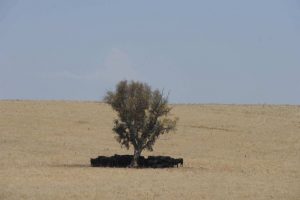
Climate Experience:
Farmer loses 80 cows due to heat stress.
Explanation:
- The region is getting hotter, Gippsland has seen 21 consecutive years with above average temperatures.[1]
Ramifications:
- Further temperature rises are expected with more extremely hot days.[2]
- Increased heat stress is already leading to the choice of more heat tolerant cattle breeds, which are of a lower meat quality.[3]
- Dairy farmers may face the choice of investing in more heat tolerant breeds of cow or on significant infrastructure for cooling systems.[4]
- Heat stress reduces animal growth, feeding rates, reproduction and milk quality.[5]
- Beef productivity is expected to drop by 19% by 2050.[6]
- Climate change may also promote disease and pest outbreaks in agriculture.[7]
What can be done?
- Email your local MP and tell them that action on climate is important to you and explain the impacts being felt in your area. One email might not feel like much but most politicians consider it to be representative of 100 citizens.
- Help support the Act on Climate collective by donating; we are leading the charge for climate action. Your donation helps in advancing policies that prevent climate change from getting worse, we aim to empower communities and build a strong pro-climate-action constituency that governments can’t ignore, and as an added bonus it’s tax-deductable.
- Get involved with Act on Climate. We meet every Monday at 6pm (upstairs at 312 Smith St, Collingwood) and welcome all newcomers to join in the fight for climate justice. If you are unable to attend, follow us on Facebook, Twitter, and Instagram to keep up with the latest campaign.
* We aim to keep our material as accurate and as relevant as possible. Working with climate science, a field that is being constantly updated, keeps us on our toes. Information on this site was gathered on June 1 2019; if you notice information that needs updating please let us know. For the full reference list please see the following.
________________________
[1]“Australian Climate Change Site Data – Sale”, Bureau of Meteorology, access April 23 2019, http://www.bom.gov.au/cgi-bin/climate/hqsites/site_data.cgi?variable=maxT&area=aus&station=085072&dtype=anom&period=annual&ave_yr=0
[2]CSIRO, “State of the Climate.”22.
[3]Hughes et al., “Feeding a Hungry Nation: Climate Change, Food and Farming in Australia.”49.
[6]Efficiency, “Fact Sheet – Victoria.”2.
[7]Sudmeyer et al., “Climate Change: Impacts and Adaptation for Agriculture in Western Australia.”79.
